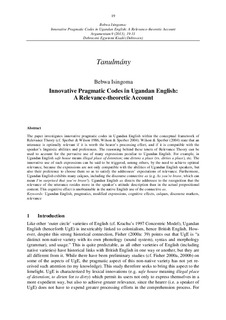| dc.contributor.author | Isingoma, Bebwa | |
| dc.date.accessioned | 2013-05-23T09:31:32Z | |
| dc.date.available | 2013-05-23T09:31:32Z | |
| dc.date.issued | 2013 | |
| dc.identifier.citation | Isingoma, B. (2013). Innovative pragmatic codes in Ugandan English : a relevance-theoretic account. Argumentum, 9, 19-31. | no_NO |
| dc.identifier.issn | 1787-3606 | |
| dc.identifier.uri | http://hdl.handle.net/11250/139321 | |
| dc.description | Published version of an article in the journal: Argumentum. Also available from the publisher at: http://argumentum.unideb.hu/2013-anyagok/bisingoma.pdf Open access | no_NO |
| dc.description.abstract | The paper investigates innovative pragmatic codes in Ugandan English within the conceptual framework of Relevance Theory (cf. Sperber & Wilson 1986, Wilson & Sperber 2004). Wilson & Sperber (2004) state that an utterance is optimally relevant if it is worth the hearer’s processing effort, and if it is compatible with the speaker’s linguistic abilities and preferences. The reasoning behind these tenets of Relevance Theory can be used to account for the pervasive use of many expressions peculiar to Ugandan English. For example, in Ugandan English safe house means illegal place of detention; one dirtens a place (vs. dirties a place), etc. The innovative use of such expressions can be said to be triggered, among others, by the need to achieve optimal relevance, because the expressions are not only compatible with the abilities of Ugandan English speakers, but also their preference to choose them so as to satisfy the addressees’ expectations of relevance. Furthermore, Ugandan English exhibits many calques, including the discourse connective as (e.g. As you’re brave, which can mean I’m surprised that you’re brave!). Ugandan English as directs the addressee to the recognition that the relevance of the utterance resides more in the speaker’s attitude description than in the actual propositional content. This cognitive effect is unobtainable in the native English use of the connective as. | no_NO |
| dc.language.iso | eng | no_NO |
| dc.publisher | Debrecen University Press | no_NO |
| dc.subject | Ugandan English | no_NO |
| dc.subject | pragmatics | no_NO |
| dc.subject | modified expressions | no_NO |
| dc.subject | cognitive effects | no_NO |
| dc.subject | calques | no_NO |
| dc.subject | discourse markers | no_NO |
| dc.subject | relevance | no_NO |
| dc.title | Innovative pragmatic codes in Ugandan English : a relevance-theoretic account | no_NO |
| dc.type | Journal article | no_NO |
| dc.type | Peer reviewed | no_NO |
| dc.subject.nsi | VDP::Humanities: 000::Linguistics: 010::English language: 020 | no_NO |
| dc.source.pagenumber | 19-31 | no_NO |
| dc.source.volume | 9 | no_NO |
| dc.source.journal | Argumentum | no_NO |
